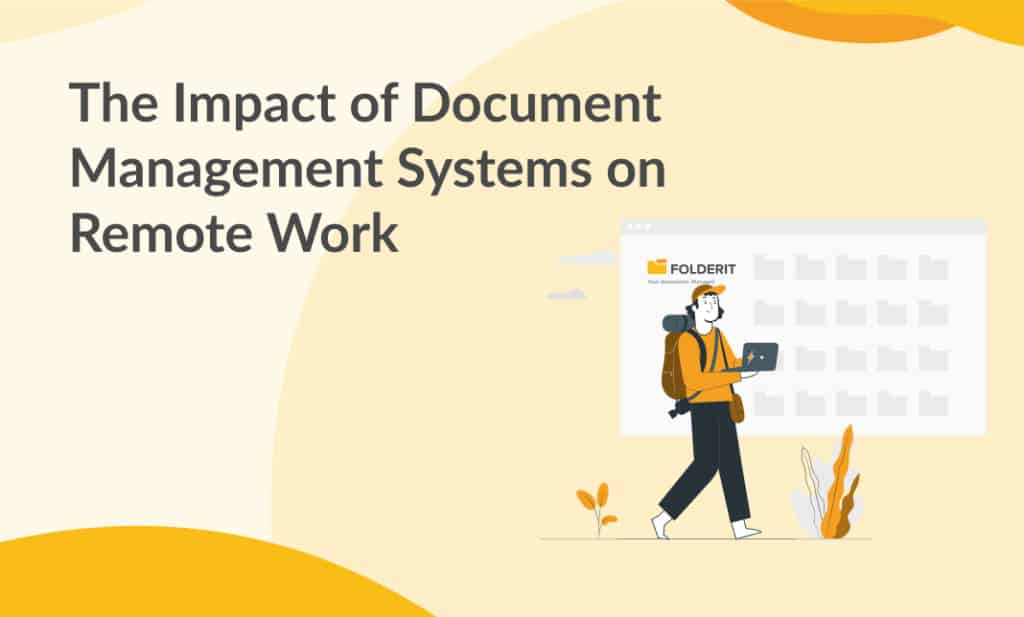The remote work landscape has grown exponentially over the past few years, with more organizations embracing flexible work arrangements. This shift has highlighted the need for efficient, secure, and accessible document management systems (DMS) to support remote workers. As such, exploration of the impact of document management systems on remote work and how they can optimize productivity, collaboration, and security in a distributed workforce is important to understand the full depth of the current and emerging digital landscape.
Enhancing productivity and efficiency
One of the key benefits of a DMS for remote work is the enhancement of productivity and efficiency. With a centralized repository for storing, organizing, and retrieving documents, remote workers can quickly access the information they need, reducing time wasted searching for files in multiple locations. This streamlined process not only saves time but also allows employees to focus on their core tasks, leading to improved productivity and overall efficiency.
Facilitating real-time collaboration
In a remote work environment, real-time collaboration is essential for maintaining strong communication and teamwork. A DMS enables employees to work on documents simultaneously, track changes, and leave comments or suggestions, fostering effective collaboration. This functionality eliminates the need for lengthy email exchanges and promotes a more dynamic and engaging work process, even when team members are physically apart.
78% of a group of 669 CEOs believe remote collaboration has to be thought of as a long-term business strategy – Intuition
Ensuring data security
With employees working from various locations, the risk of data breaches and unauthorized access to sensitive information increases. A robust DMS provides advanced security features such as role-based access control, encryption, and audit trails, ensuring that only authorized users can access specific documents. This added layer of security is crucial for remote work, as it protects the organization’s sensitive data and maintains compliance with data protection regulations.
Streamlining document workflows
A DMS allows organizations to automate and streamline document workflows, ensuring that each step in the process is followed consistently and efficiently. This is particularly valuable for remote workers, as it helps maintain a structured approach to document creation, review, and approval, even when employees are not co-located. With automated notifications and reminders, tasks are less likely to be overlooked, and projects can move forward smoothly.
Enabling access from any device and location
One of the main advantages of a DMS in a remote work setting is the ability to access documents from any device and location. This flexibility is vital for employees who need to work on-the-go or switch between devices. A cloud-based DMS provides remote workers with secure access to their documents, allowing them to stay connected and productive, regardless of their physical location.
According to Intuition, 77% of employees say that working remotely will help their company lower operating costs’
Simplifying version control
In remote work scenarios, keeping track of multiple document versions can become challenging. A DMS offers version control features that allow employees to track document revisions, ensuring that everyone works on the most up-to-date version. This eliminates confusion, prevents duplication of work, and reduces the risk of errors due to outdated information.
Reducing reliance on paper
Transitioning to a paperless office is not only environmentally friendly but also more practical for remote work. A DMS helps organizations digitize their documents, reducing the need for physical storage and the challenges associated with accessing paper files remotely. By eliminating the dependence on paper, remote workers can access and share digital documents with ease, contributing to a more efficient and agile work environment.
Improving compliance and record-keeping
Maintaining compliance with industry regulations and record-keeping requirements can be difficult when managing a remote workforce. A DMS helps simplify this process by providing tools for tracking document revisions, managing retention schedules, and generating audit reports. This functionality allows organizations to demonstrate compliance with regulatory requirements and ensures that important records are properly maintained, even in a remote work setting.
Document Management Systems and Remote Work Go Hand In Hand
The impact of document management systems on remote work cannot be understated. By providing a centralized, secure, and accessible platform for document storage and collaboration, a DMS supports remote workers in achieving their full potential. The numerous benefits of implementing a DMS in a remote work environment include enhanced productivity, real-time collaboration, data security, streamlined workflows, and device-agnostic access.
Furthermore, a DMS simplifies version control, reduces reliance on paper, and improves compliance and record-keeping. By embracing a document management system, organizations can create a more resilient, agile, and efficient remote work environment that drives growth and success in the increasingly digital world.
Conclusion
In conclusion, the shift to remote work has emphasized the need for effective document management solutions. By investing in a robust DMS, organizations can empower their remote workers, streamline processes, and maintain the highest levels of security and compliance. As remote work continues to evolve, a document management system will play an increasingly important role in shaping the future of work and ensuring the success of distributed teams.



